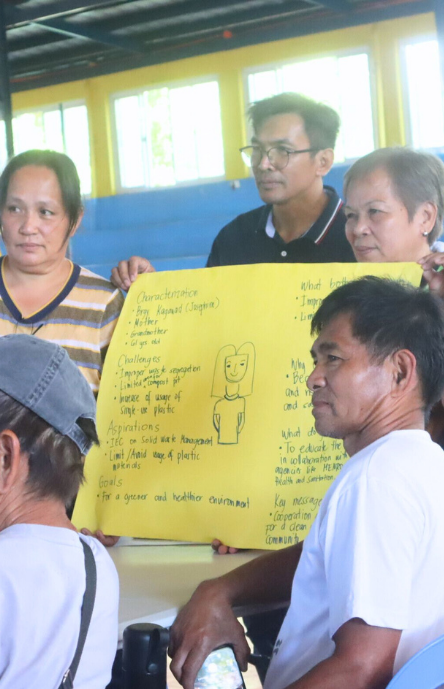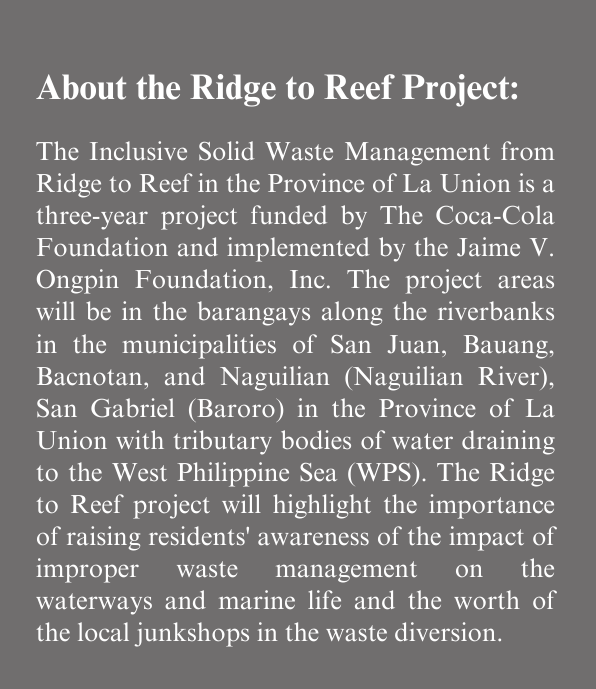



Barangay representatives and junkshop owners from the municipalities of Cluster 1 (Naguilian and Bauang) and Cluster 2 (San Gabriel, San Juan, and Bacnotan) participated in a two-day workshop on Participatory Rural Appraisal (PRA) and Training Needs Assessment held on November 21–22 and November 27–28, 2024.
The workshop aimed to introduce and enhance the understanding of Participatory Rural Appraisal, facilitate data sharing, and review barangay resources, issues, and concerns related to solid waste management. The goal was to identify potential programs, projects and activities addressing the concerns raised during the sessions. The activities were facilitated by Mr. Celso Jucutan of DMMMSU, Mr. John Benedict Marasigan of PGLU, MENRO, Ma’am Gloria Sison of SLC, and JVOFI staff, who also assisted in interpreting the participants’ outputs.
During the workshop, participants were grouped by municipality. On the first day, they used PRA tools such as Empathy Mapping, SWOT Analysis, Stakeholders Mapping, and Gender seasonal Calendar to identify motivations, challenges, goal setting, and communications plan. This was then sustained on the second day. The workshop continued with Resource Mapping, Visioning, and Training Needs Assessment for Eco-Enterprise Development. Participants also developed forward plans for each barangay in Naguillan, Bauang, Bacnotan, San Juan, and San Gabriel focusing on how to maximize and utilize available resources effectively in managing their solid wastes.
Benny Quillas, Jr. participant from San Gabriel shares experience: “First time ko maki-training workshop iti kakastoy nga balbalan ta first time ko magbalin magsecretary dyay barangay mi ngem base iti obserbasyon ko iti daduma idyay kapalpalasan maunat na napintas daytoy nga worskhop ta from the first day nakita ngay dyay pagkakaisa kasi dyay uneg ti barangay nga talaga aminin tayo man kin saan dagidyay lang barangay officials ada met maki participate dagita nga community from ditoy ngay talagang napiga tayong lahat, nag-isip tayong lahat, nagplano tayong lahat, ibinigay nating lahat, nagpresent tayong lahat. In the end, lahat tayo natuto.”
“This was my first time attending a workshop like this. It was also my first time serving as our barangay secretary, which was eye-opening. Throughout the workshop, I observed how other barangays collaborate and handle their challenges. This workshop was truly valuable because, from day one, it fostered unity among us. As barangay officials, we admitted our shortcomings but worked together. Everyone participated, planned, and presented wholeheartedly. In the end, we all learned a lot.”
Despite the presence of ordinances, material recovery facilities, and landfills, these resources remain insufficient to address the waste management needs of all municipalities in La Union. The main challenge lies in the behavior and knowledge of constituents regarding proper waste segregation. However, the workshop emphasized that changes at the household level could create a ripple effect, significantly improving waste management practices. Through this activity, participants were able to outline future steps and strategies to address solid waste management challenges in their communities.
